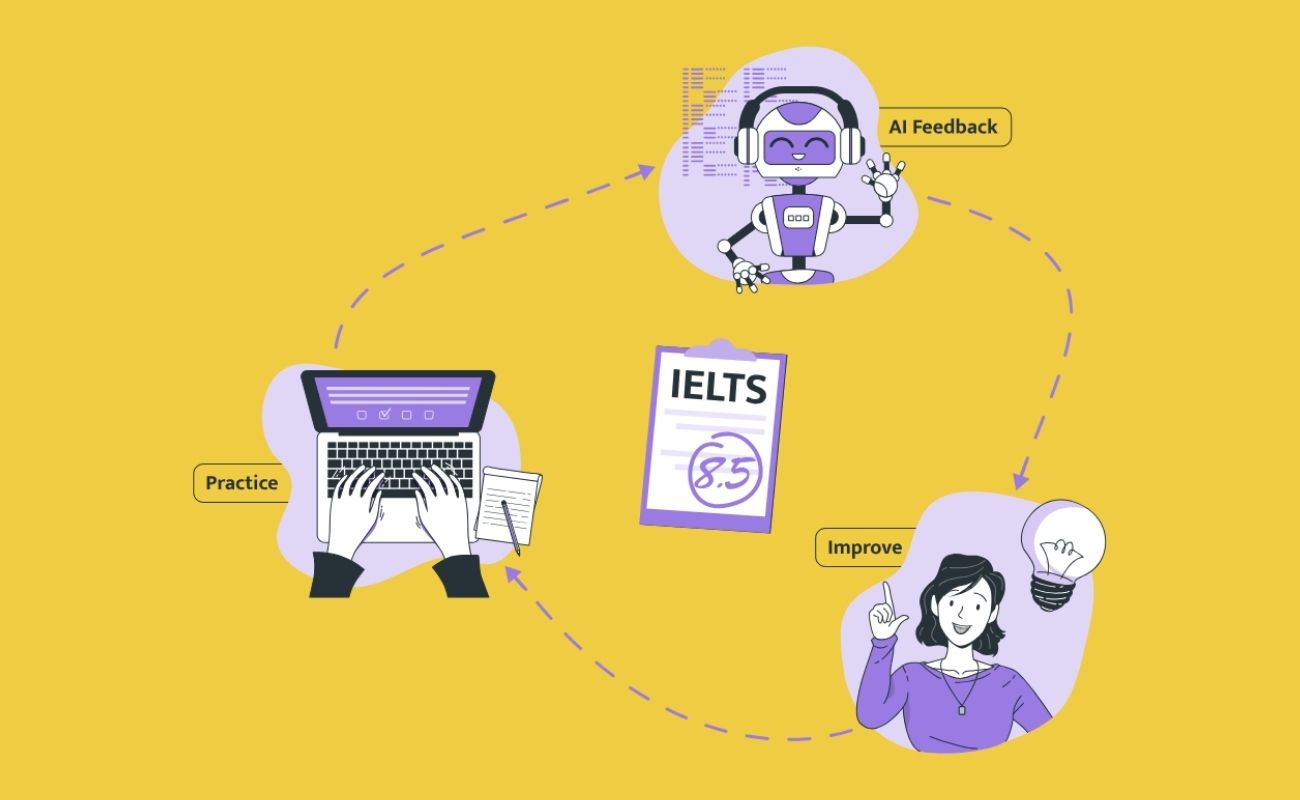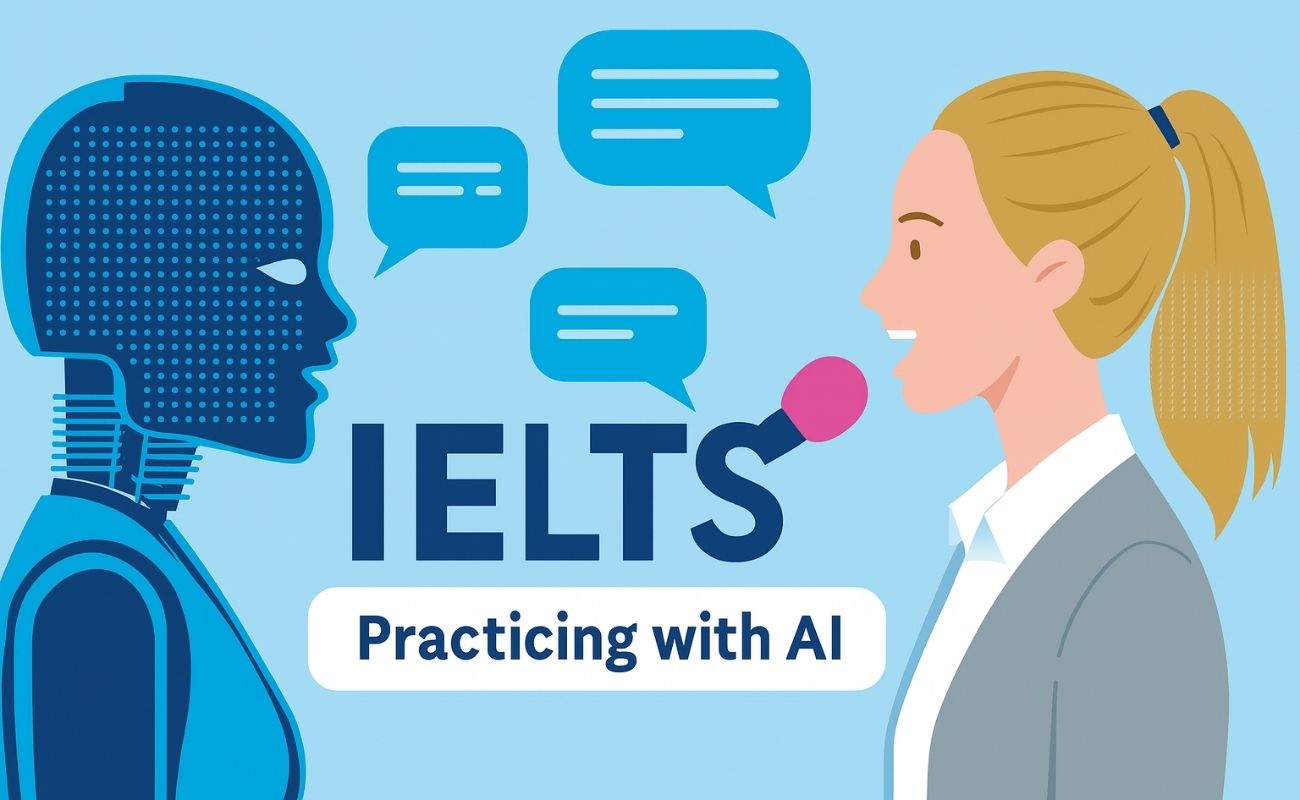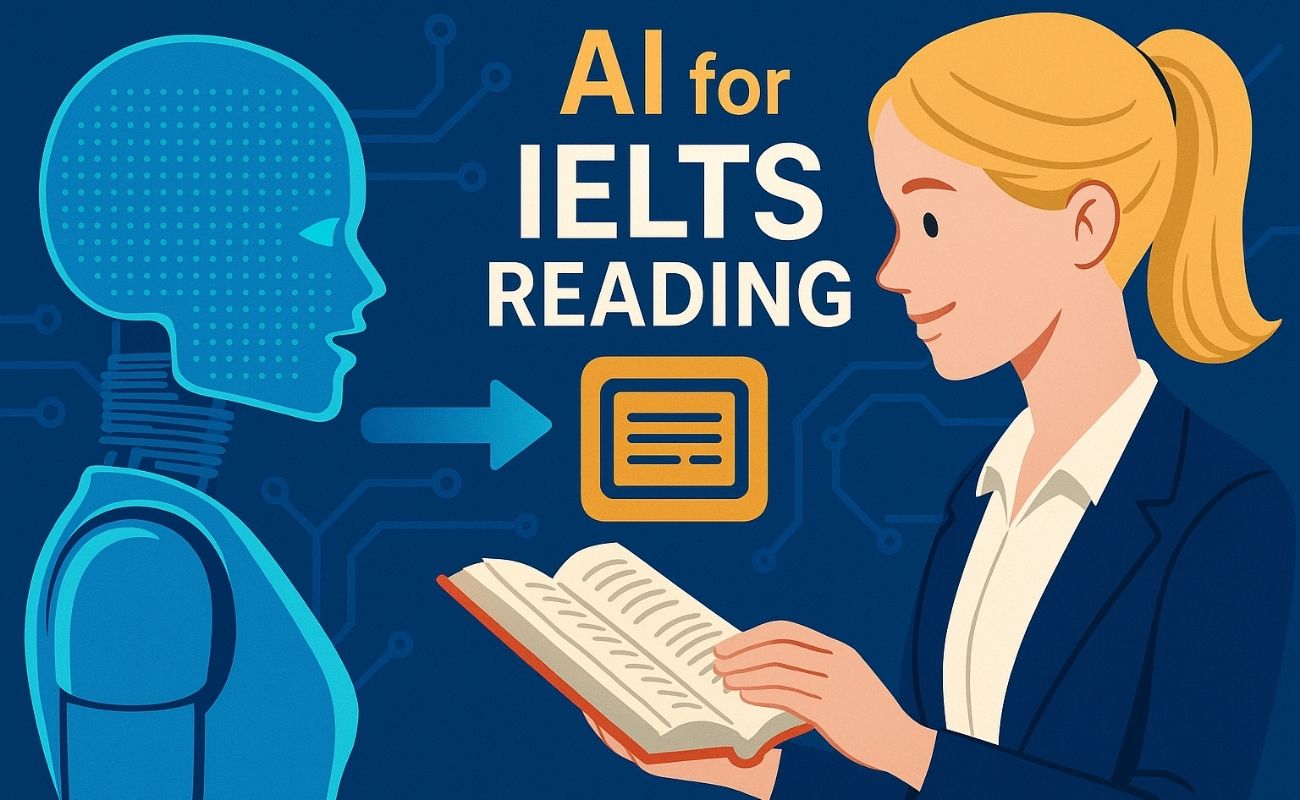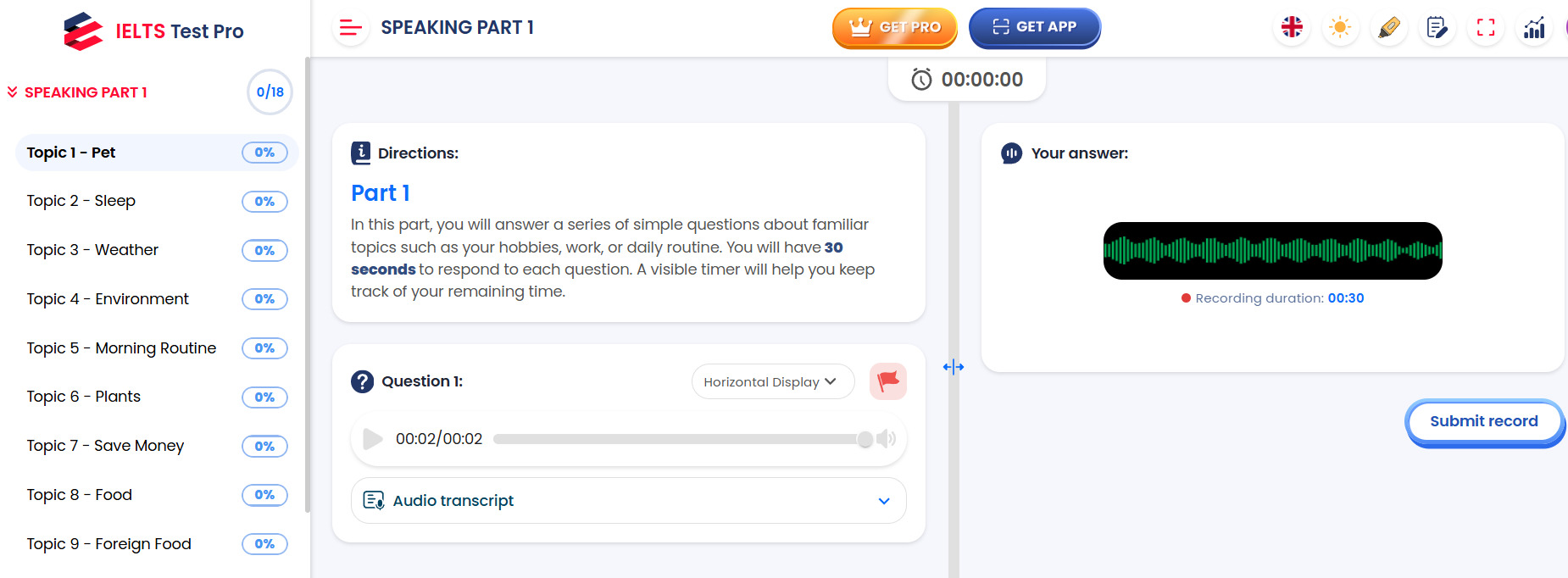AI IELTS Learning: Smarter Preparation for IELTS Band 6.5+
Year after year, sit the IELTS exam every year, but progress often stalls below band 6.5. In this guide, you’ll discover how AI IELTS delivers instant feedback, tailored practice, and smarter ways to prepare for every skill.
What is AI IELTS?

AI IELTS is the use of artificial intelligence to practice IELTS. With AI-powered IELTS practice tests, learners can simulate real exam conditions, receive instant scoring, and track their progress in all four skills.
The power of AI IELTS lies not just in speed but in precision. In particular, it reviews your speaking fluency in seconds, spots weak points in writing, and even measures your listening and reading pace. This makes your preparation smarter, faster, and more affordable.
Why use AI for IELTS preparation?
Passing IELTS is not just about how much you practice, but how smartly you practice. Many learners get stuck because they repeat mistakes without noticing them, or spend too much time waiting for feedback. AI-powered IELTS practice tests cut through all those barriers.
Key reasons to use AI in your IELTS journey:
- Instant scoring, zero waiting: No more waiting days for teachers to mark essays. AI-powered IELTS practice tests provide immediate evaluation, so you know your level the moment you finish.
- Personalized feedback, not generic tips: AI IELTS pinpoints your weak spots so every correction is relevant.
- Cost-effective learning: Classes can cost hundreds of dollars, but AI tools offer affordable access to structured practice and detailed feedback 24/7.
- Consistency and accuracy: Human feedback can vary, but AI-powered IELTS practice tests apply the same scoring logic every time.
- Motivation through progress tracking: Seeing your band score gradually rise on dashboards keeps you motivated and accountable.
How AI enhances IELTS practice by skill
Every skill demands a different strategy, and that’s where AI IELTS shines. With AI-powered IELTS practice tests, your speaking becomes clearer, writing sharper, listening quicker, and reading more accurate.
AI for IELTS speaking
Speaking often feels like the toughest skill: it’s not just vocabulary, but fluency, coherence, and confidence under pressure. With AI-powered IELTS practice tests, you can rehearse the real format, practice with targeted prompts, and get structured feedback in minutes instead of days.

Try these ready-to-use prompts depending on your goal:
Prompt 1: Full speaking test simulation:
You are now my IELTS Speaking examiner.
– Follow the exact IELTS Speaking format (Part 1, Part 2, Part 3).
– In Part 1: Ask me 8-10 random questions from at least 3 different common topics. Wait for my answers (~30 seconds each).
– In Part 2: Give me 1 cue card with the topic + 3 bullet points. Allow me 1 minute to prepare. Let me speak for 2 minutes, then stop me.
– In Part 3: Ask 4-5 deeper questions related to the Part 2 topic. Let me answer ~1 minute each.
Important:
– Do NOT give feedback during the test.
– At the end, provide feedback only on grammar, vocabulary, fluency, coherence, and pronunciation (if possible).
– Do not give me a band score.
Prompt 2: Part 1 practice
You are my IELTS Speaking Part 1 examiner.
Ask me 15 random questions from at least 3 different topics (hometown, studies, hobbies, food, daily routine, etc.).
Ask one question at a time. Wait for my answer (~20-30 seconds) before moving to the next.
Do not comment until I finish all 15 answers.
At the end, give feedback on fluency, grammar, and vocabulary.
Read more: IELTS Speaking part 1 – Overview, topics and tips
Prompt 3: Part 2 practice
You are my IELTS Speaking Part 2 examiner.
Give me 1 cue card with a topic and 3-4 guiding bullet points, exactly like in IELTS.
Allow me 1 minute to prepare, then let me speak for 2 minutes. Stop me exactly after 2 minutes.
After I finish, give me feedback on idea development, coherence, grammar, and vocabulary.
Read more: IELTS Speaking part 2 – Overview, topics and tips
Prompt 4: Part 3 practice
You are my IELTS Speaking Part 3 examiner.
Give me 5 analytical questions related to one Part 2 topic.
Ask one question at a time, wait for my ~1-minute answer, then continue.
At the end, summarize how well I expressed opinions, supported with examples, and developed arguments.
Read more: IELTS Speaking part 3 – Overview, topics and tips
Prompt 5: Feedback-focused session
You are my IELTS Speaking coach.
I will answer 5 IELTS Speaking questions of your choice.
After I finish all 5, provide detailed feedback on:
– Pronunciation (intonation, clarity)
– Grammar accuracy
– Vocabulary range & appropriacy
– Fluency & coherence
Give practical tips for improvement, but do not assign a band score.
Prompt 6: Pronunciation & intonation practice
Act as my IELTS Speaking pronunciation coach.
I will answer 5 questions.
After each answer:
1. Repeat my answer in correct English pronunciation and natural intonation.
2. Highlight any mispronounced words and show me the correct way.
Do not correct grammar or vocabulary-focus only on pronunciation and stress.
AI for IELTS writing
Writing is where most learners lose points, not because they lack ideas, but because feedback comes too late. With AI IELTS, that gap closes.
You can draft essays, receive instant corrections, and refine your writing until it meets exam standards. The best part? You can practice Task 1 and Task 2 anytime, as often as needed, without waiting days for a teacher’s red pen.
Here are optimized prompts you can copy-paste to get the best out of your practice:
Prompt 1: Full writing test simulation (Task 1 + Task 2)
You are my IELTS Writing examiner.
– Give me 1 Academic Task 1 prompt (chart, graph, process, or map).
– Give me 1 Task 2 essay question.
I will write both answers. After I finish, evaluate them based on IELTS criteria:
1. Task Achievement / Task Response
2. Coherence and Cohesion
3. Lexical Resource
4. Grammatical Range and Accuracy
Provide corrections with examples of better vocabulary, sentence structures, and linking devices.
Do not assign a band score. Instead, explain how to improve toward Band 7 or higher.
Prompt 2: Task 1 focus
You are my IELTS Writing Task 1 coach.
Give me 1 Task 1 Academic prompt.
After I write, provide:
– Corrections for grammar and vocabulary
– Alternative ways to describe trends and comparisons
– Sample high-level phrases to describe visuals naturally
Prompt 3: Task 2 focus
You are my IELTS Writing Task 2 examiner.
Give me 1 Task 2 essay question.
After I write, I evaluate based on IELTS criteria and provide:
– Strengths and weaknesses of my essay
– Specific improvements for arguments, coherence, and vocabulary
– A short Band 8 sample essay for comparison
See also: IELTS Writing Task 2 phrases
Prompt 4: Idea generation
You are my IELTS Writing brainstorming partner.
Give me 3 IELTS Writing Task 2 questions. For each, generate:
– 2-3 main ideas
– Supporting examples (facts, logic, real-world data)
– Useful academic vocabulary and collocations
Prompt 5: Paraphrasing practice
You are my IELTS Writing paraphrasing coach.
I will paste sentences from my essays.
For each sentence, provide 3 alternative versions that are natural and grammatically correct.
Highlight vocabulary or structure changes that make the paraphrase stronger.
Prompt 6: Feedback-only session
I will paste my IELTS Writing essay.
Do not rewrite it.
Instead:
– Mark grammar mistakes
– Suggest better vocabulary
– Point out weak logic or cohesion
– Recommend one focused exercise to fix my main weakness
AI for IELTS listening
Listening trips up candidates not because the audio is hard, but because details slip away like numbers, names, or one missing keyword. AI IELTS helps you catch them before they cost you marks.
How to apply AI for Listening:
- Error analysis in real time: After you finish a test, AI pinpoints where you lost focus. It doesn’t just mark “wrong”, it explains why.
- Adaptive replays: AI can instantly cut the audio into smaller chunks and replay only the sections you missed.
- Shadowing practice: Upload your own recording while repeating after the audio. AI checks pronunciation and rhythm, then highlights words you swallowed or stressed incorrectly.
- Smart drills: You can prompt AI like this:
Give me 10 IELTS-style listening questions focusing only on numbers and spelling.
Provide instant correction after each.
AI for IELTS reading

Many learners waste time scanning the whole passage. AI IELTS changes that by training you to read with purpose.
Here’s how to apply it:
- Question-type drills:
I struggle with True/False/Not Given questions.
Give me 10 IELTS-style passages with one question each.
After I answer, explain step by step why the correct choice is right.
- Keyword mapping: Paste a passage and a question into AI and ask:
Show me the keywords in the passage and in the question.
Teach me how to locate the matching sentence quickly.
- Speed training: With AI-powered IELTS practice tests, set timers for each passage. AI tracks your words-per-minute and shows whether you’re hitting the Band 7+ benchmark (250-300 wpm).
- Paraphrase detection:
Highlight synonyms and paraphrases in this passage that match the question. Explain how IELTS uses paraphrasing to test me.
See also: IELTS reading techniques
Best AI IELTS tools and apps
Not all apps are created equal. Some tools test you, others train you, but the best combine both. If you want AI IELTS practice that actually feels like a real test, here are the most useful apps and tools you can try today:
- ChatGPT: A flexible AI partner for prompts. You can simulate full Speaking tests, generate Writing questions, or request structured feedback. With the right instructions, ChatGPT doubles as an examiner and a coach.
- IELTS Test Pro: Free practice for all four skills, with AI-powered IELTS practice tests in Speaking and Writing. Get instant scoring and feedback on fluency, grammar, coherence, and task achievement.

- Write & Improve by Cambridge: Submit essays and receive AI feedback in minutes, making it perfect for writing tasks 1 and 2.
- Ejoy AI Speaking: Focuses on speaking with voice recognition and real-time pronunciation checks.
- IELTS Online Tests: Large library of mock tests with AI evaluation modules for Writing and Speaking.
Success tips to maximize your IELTS score with AI tools
Using AI IELTS tools only works if you use them smartly. They give you feedback, but it’s how you act on that feedback that lifts your band score.

- Practice with intent, not habit: Don’t just take endless tests. Each time you use AI IELTS, review your mistakes, note patterns, and fix them before moving on.
- Balance AI with human input: AI-powered IELTS practice tests are great for instant scoring, but pair them with teacher or peer review to catch nuances AI might miss.
- Set clear goals per session: One day for speaking fluency, another for writing coherence. Focused practice makes AI feedback sharper and easier to apply.
- Track progress visibly: Use dashboards or logs from AI IELTS apps to see whether your weak skills are turning into strengths over weeks, not just days.
Conclusion
With AI IELTS, practice stops being guesswork and starts being progress. AI-powered IELTS Practice Tests give you instant feedback, tailored prompts, and realistic simulations, especially in Speaking and Writing. On IELTS Test Pro, you can train all four skills and get AI scoring where it matters most, turning preparation into confidence and effort into results.
FAQs
- What is the limitation of AI-powered IELTS?
AI IELTS gives instant scoring and feedback, but it cannot fully assess nuance in ideas, cultural context, or complex pronunciation.
- Does using AI mean I can skip classes?
No. AI-powered IELTS practice tests support self-study, but classes or teacher feedback are still valuable for advanced correction.
- Can AI help me reach band 7 or higher?
Yes, if you practice consistently, review AI feedback carefully, and apply it in real test conditions.